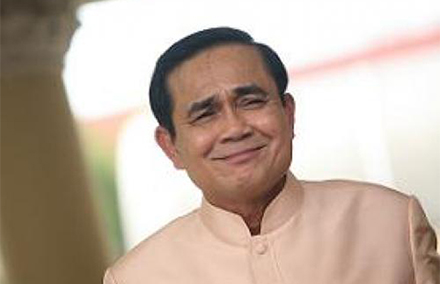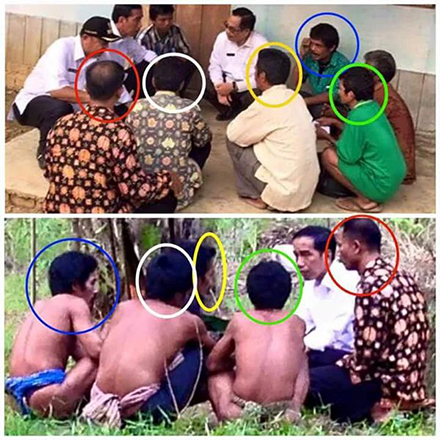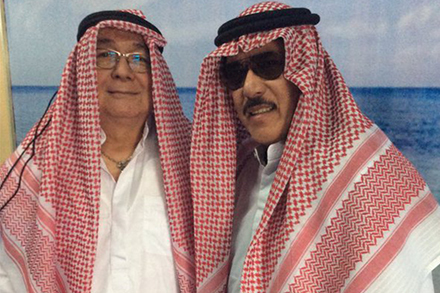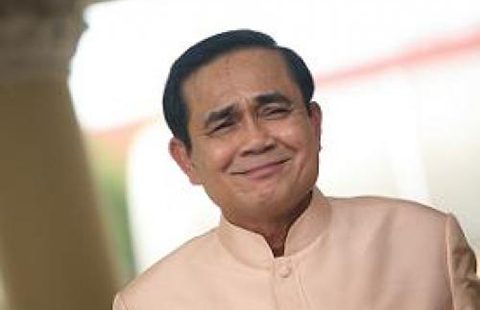New Mandala associate editor Mish Khan wades through the week that was in this crazy, chaotic corner of the globe.
This week she casts her eyes over phony photos in Indonesia, Halloween and ‘scary’ Muslims in the Philippines and the Thai junta’s re-writing of history.
Thai junta publishes book, and the rest is history
A new book published by the Thai junta has been slammed as both historically flawed and transparently propagandist by academics.
“The Thai History” was officially requested by the government to “instruct patriotism” among Thai students and citizens, and was written upon request by the Ministry of Culture in just under two months.
For the bargain price of less than $US 4, you can indulge claims such as “General Prayuth Chan-ocha became Prime Minister to implement policies of national and political reform for the achievement of true democracy”, or learn how “to be grateful to the kindness of the great kings who defended the populace from all difficulties and hardships.”

Prayuth’s leadership hasn’t put a smile on everyone’s face.
In an incredibly unsubtle move to legitimise military rule, endorsing such unabashedly biased historical accounts contradicts the apparent reconciliation agenda of the ruling government.
Copies of the book will be distributed to schools and public offices around the nation.
Unfortunately, if you were after an exclusive copy signed by General Prayuth, Thailand’s military leader, these have sold out.
Indonesia silences speculation on phony photo
A photo depicting Indonesia’s President Jokowi speaking with members of the remote Suku Anak Dalam tribe has gone viral due to suspicion the incident was forged.
In response to the online buzz, the National Police has threatened netizens that speculating on the authenticity of the image is a form of “defamatory hate speech” and will be treated as criminal.
Jokowi tweeted the original photo, captioned, “The Suku Anak Dalam are a part of us. They need adequate living space.” He received praised for his apparent engagement with the remote community.
However, the following day a photoset tweeted by Former Minister of Youth and Sports Roy Suryo became widely circulated.
It included a photo of the “tribesmen” in traditional clothing, next to another photo with men in more modern outfits. Netizens picked up on the similarities between both sets of men, suggesting the entire incident was engineered for publicity. Social Affairs Minister Khofifah Indar Parawansah has denied these allegations.

Legally, the police cannot pursue a defamation case until the complainant has filed charges, but say they will investigate the speculations regardless to gather “intelligence data”.
In light of a controversial recent circular encouraging all members of the police force to actively fight hate speech, this reaction forebodes an increased climate of censorship in Indonesia.
No candy for Sotto after irking Filipino Muslims
The government of the Autonomous Region in Muslim Mindanao (ARMM) has asked Senator Tito Sotto to apologise following his appearance on a popular television show’s Halloween special while dressed up as a Muslim.
Sotto donned an ankle length white throbe, complete with a keffiyeh on his head to mark Halloween. Unsurprisingly, this attracted public outrage, particularly from the largely Islamic ARMM area.
Defending himself, Sotto stated his “Sheikh friend” gifted him the attire. “He likes it when I wear it… I suggest the people complaining should find out more about the origin of Halloween.”

Senator Tito Sotto and robe (right)
It is unclear what exactly this would illuminate, given that Halloween originates from the ancient Celtic festival of Samhain, where costumes were worn to ward off evil spirits.
ARMM Governor Mujiv Hataman stated that Sotto “Equated the Muslim garb as a costume to be feared, in the way that zombies and ghouls are to be feared.
“In our community, Muslims are quite often discriminated against, stereotyped as troublemakers and terrorists.”’
In the Philippines, the indigenous Moro Muslim population has long struggled for autonomy amidst a decade of collapsed peace talks in the primarily Christian nation.
Mish Khan is a combined Law and Asian Studies student at the Australian National University and Associate Editor at New Mandala.
Read Mish’s take on the Tatmadaw’s ‘Arab Spring’ video from our ‘Myanmar and the votes’ series here.
 Facebook
Facebook  Twitter
Twitter  Soundcloud
Soundcloud  Youtube
Youtube  Rss
Rss 